UF in Cuzco – Service Learning for the Health Professions
Greg Moreland
The University of Florida International Center (UFIC) has recently engaged in an initiative to develop study abroad programs with a focus on service-learning and bridging disciplines.
As part of this effort, Drs. Gillian Lord and Marta Wayne, Chairs of the Departments of Spanish & Portuguese Studies and Biology (respectively), teamed up to propose a joint study abroad program in Cuzco, Peru, that would focus on service learning for the health professions. In Spring 2015 they were awarded a UFIC grant to develop the program, and in June they conducted a site visit and finalize the details.
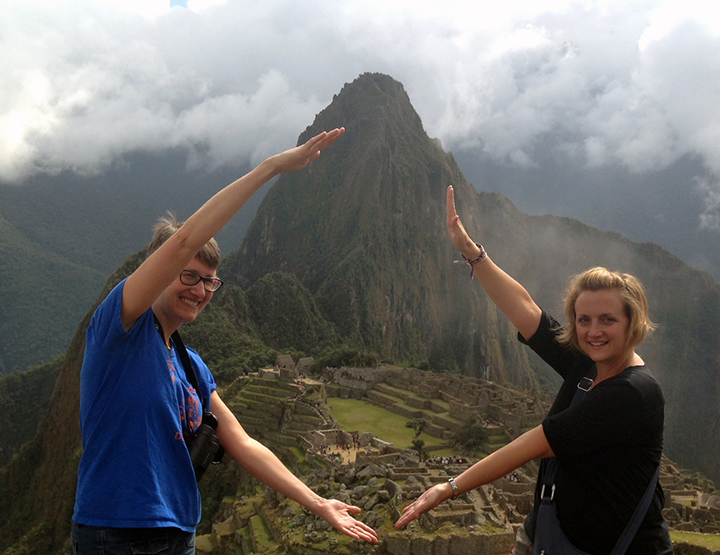
Drs. Gillian Lord and Marta Wayne teamed up to propose a joint study abroad program in Cuzco, Peru, that would focus on service learning for the health professions.
We are thrilled to launch this 6-week program in Summer 2016, with the following goals: promote increased Spanish proficiency; explore Peruvian culture, with an emphasis on health-related systems; provide our students with experiential learning opportunities in health-related disciplines; and make meaningful connections with the Cusqueño community. Students on the inaugural offering of the program will take a pair of courses: SPN 3948, “Spanish Service Learning,” taught in Spanish by Dr. Greg Moreland (SPS), and ZOO 4956, “Emerging Disease in the Americas,” taught in English by Dr. Tom Hladish (Biology).
In partnership with International Studies Abroad (ISA), the students will also enjoy homestays, numerous local activities, and weekend excursions to Puno/Lake Titicaca, the Sacred Valley, and Machu Picchu. We are extremely excited about this endeavor and its long-term prospects, and look forward to helping our first group of Gators to experience the wonders of Peru.
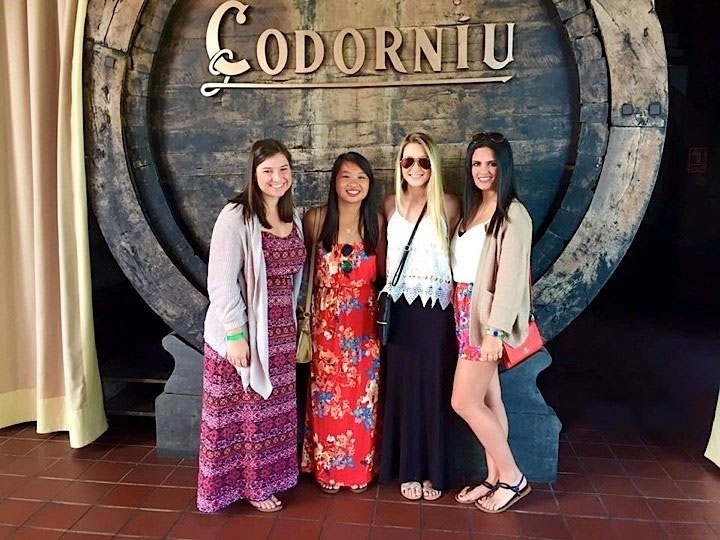
UF in Barcelona
Francesc Morales
Summer 2015 marked the second year of our study abroad program in Barcelona, Spain. Nineteen students enjoyed the experience of studying language and learning about language, business, art and history. Although the coursework is intensive, those seven weeks offered students the opportunity of a lifetime, while fulfilling their language requirement for graduation. In addition to their classes, the students visited many cities along the northeastern coast of Spain. They especially enjoyed a boat trip between Roses and Cadaqués, a town frequented by Salvador Dalí and other artists such as Pablo Picasso, Joan Miró, Marcel Duchamp, and Richard Hamilton. Also important was the visit to Codorníu Winery, in the province of Barcelona, where we traveled by train through the network of caverns used to produce the sparkling wine known as cava.
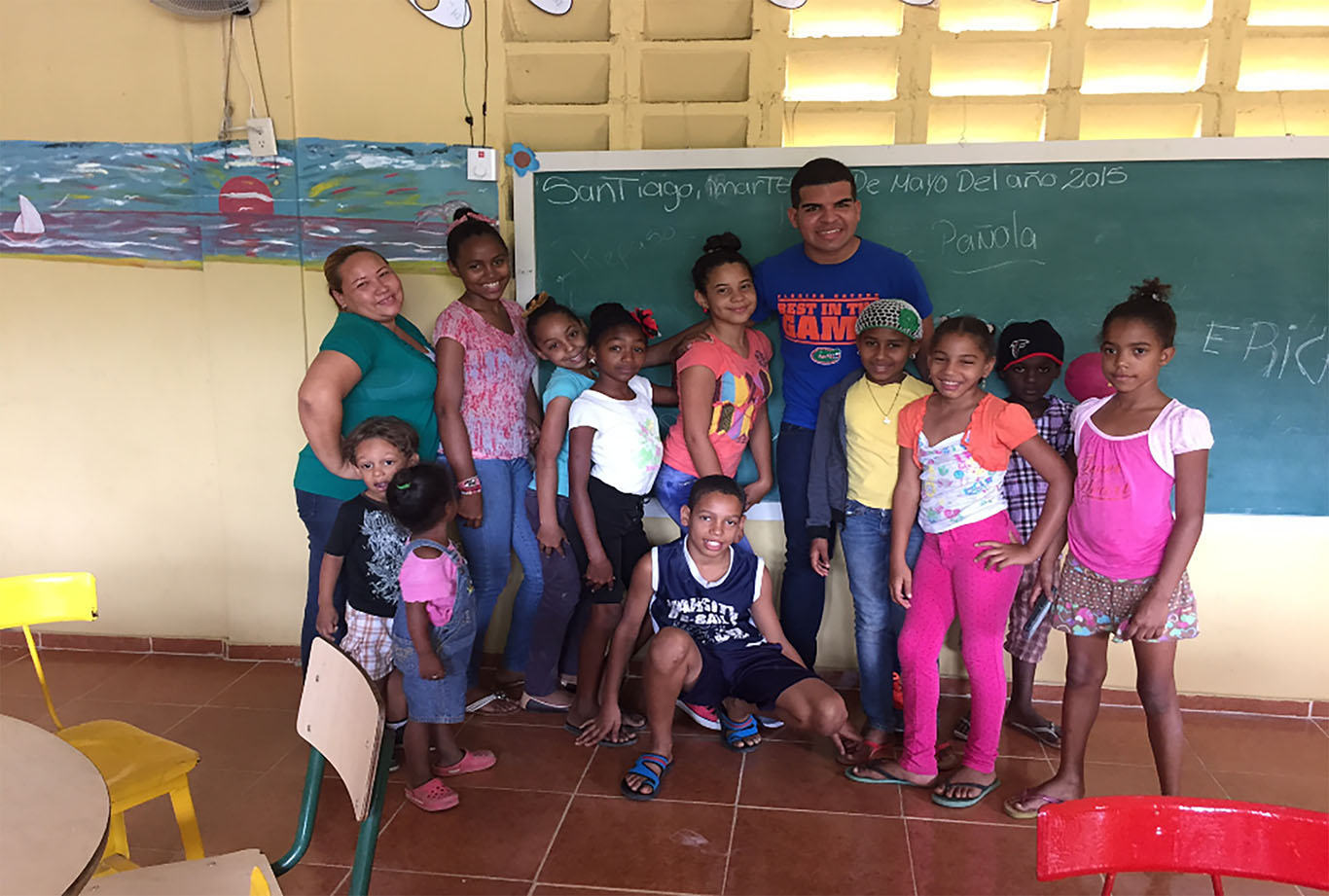
Service Learning in the Dominican Republic
Clara Sotelo
The group of students doing Service Learning in the Dominican Republic this past summer, 2015, brought an eagerness to render service and an enthusiasm for learning. Students took two courses and carried out weekly service hours in health clinics or education centers in some of the poorest areas of Santiago. The students doing clinical work at Health Centers were surprisingly knowledgeable, and both I and the health care professionals they worked with were impressed. Students always wanted to do more and nothing would deter them from collaborating with the tasks at hand. Some of them kept a notebook where they would write down little notes on aspects they cared to further understand or vocabulary words they never heard before and wanted to remember. Those that chose to teach at the “Salas de tarea” in the Education Centers were, likewise, eager to try new lessons, games, and other creative activities.
In spite of a somewhat convoluted city – undergoing local pre-election campaigns, with people competing and rejecting the ideals of their contenders with fury, and a drought that kept the gardens and some local spirits dried – the students enjoyed themselves, and they are thankful for the opportunity and the universe of knowledge that opened before their eyes. Their smiles spoke loudly. “We want to help. We understand! We can always do more. We are doing OK.” They learned a lot and, most importantly, became stronger and more compassionate. Any difficult moments were more than made up for by the satisfaction of knowing they learned and had a positive influence on others.

Rebekah Dain (UF), Emerald Snow (UCLA), Ramón Quintero (UCLA), Kevin Funk (UF), Andréa Ferreira (Instructor, UF), Heather Bergseth (UF), Michael Waylen (UF), Cristy Jones (Spelman), Ken Kliesner (Illinois), Mimi Saunders (Columbia),
UF in Rio de Janeiro
Dr. Libby Ginway and Teaching Assistant Andréa L. Ferreira
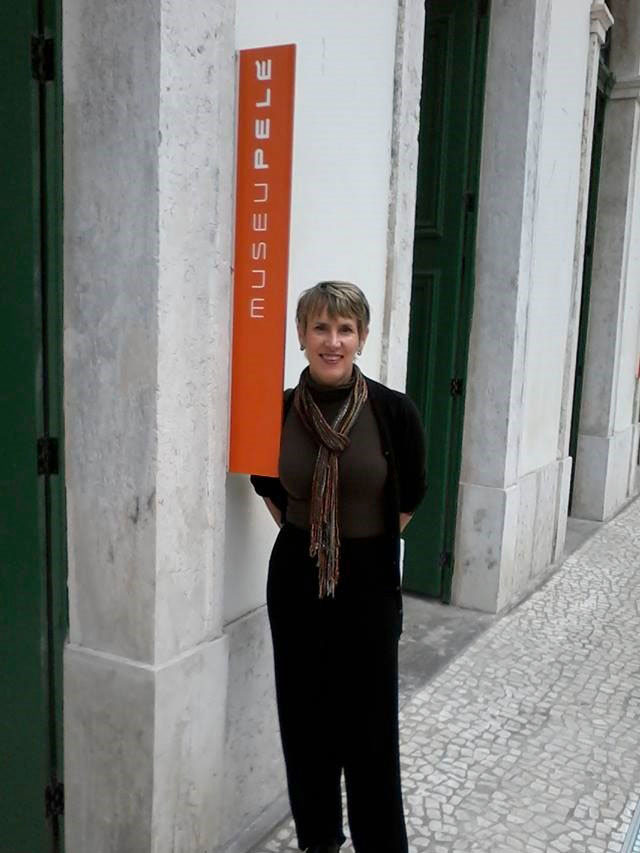
This was the 34th year of the Rio Language and Culture program. Along with intensive language study, the 2015 course focused on Brazil’s experience hosting both the 2016 Summer Olympics and the 2014 World Cup. While international sporting events put Brazil on the world stage, they also offer a unique opportunity to examine important issues such as sustainability, race and citizenship. We had students from UF, Spelman College, UCLA, University of New Mexico, Johns Hopkins, Florida International University, Columbia and the University of Illinois participate in the program.
Cristy Jones, a participant from Spelman College, shares her enthusiasm for the program: “I am so glad that I studied with the UF in Rio program. Initially, I was very nervous and timid because I was at a very low level in Portuguese and I felt out of place. However, professors Ginway and Ferreira made my experience enjoyable and they boosted my confidence greatly! From this course, I have learned so much about Braziliatur and I now have a newfound appreciation for the Portuguese language! Thank you, UF and FLAS for this experience!”
A continuing commitment to Santiago, DR
Kathryn Dwyer Navajas
UF in the Dominican Republic is UF’s first international service learning program. Since 2012 we have taken UF students there to work in the study centers of Acción Callejera, an NGO that works with kids, doing interventions with those living on the street, prevention with kids living in poverty, and advocacy around the rights of children. The people of Acción Callejera are from Santiago and they’ve worked only in Santiago since 1989. Neighborhood leaders know them; hoping to save their kids from the street they ask them to set up the study centers. In the Dominican Republic, being literate doesn’t guarantee anything, but being illiterate guarantees permanent poverty.
Most UF students who participate are learning to speak Spanish; they have a couple of semesters of Spanish under their belt. A very few are native speakers. Some have tutored kids or worked in summer camps. There are always several who have done mission work. Our program is not a mission; it’s not even service—it’s an exchange. The Acción Callejera kids are fully fluent but they don’t read or write. Our students teach those kids to read and write in Spanish, and the kids teach our students to speak Spanish more fluently, as well as important truths like the fact that a banana serves as rocket fuel for learning, that a kite made out of a plastic bag and few sticks of bamboo can make you happy all afternoon, that no matter how little one has, it is better when shared.
I have directed study abroad programs for UF since 2002, but this one is different. Students come back transformed—they change majors or add a minor to focus more on education, they take more Spanish classes, they stay in touch with their host families, they return to visit or work or study in the DR. They come out in droves to recruit for next year’s program, anxious to keep helping the kids in Santiago who taught them. They are required to do 36 hours of service over six weeks; most do over 50 hours—it’s a powerful connection. And yet, at the end of the program students used to say “I wish I could have done more”.
With that in mind, in the Spring of 2015 I went to Santiago on Professional Development Leave and worked with the teachers of Acción Callejera to develop a volunteer manual for UF students so they could be more effective, and come home more satisfied with what they had done. I spent six weeks visiting the study centers, filming, taking notes, asking the teachers what they wanted our students to be able to do. I worked with a Peace Corps volunteer—who happened to be a UF graduate from the College of Education—who was doing training with the teachers. I prepared a 20-page manual with a glossary of terms, descriptions of educational games and explanations of how to teach the alphabet, reading, writing, and math. It includes instructional videos, games for recess, cultural information, and the pedagogical approach that Acción Callejera takes. At the end of my time there one teacher took my hand and said “Bring us volunteers who can teach us something!”

“For me, this is not just study abroad; this is collaboration. It is not about tourism; it’s about teaching.”
This year I am working with the College of Education to fulfill that request. Dr. Maria Coady is helping me find students who can teach the teachers in Santiago. She will offer a course on line and then join us in Santiago for three weeks in Summer 2016.Teacher training is not what it should be in the Dominican Republic, and teachers there, even more than teachers here, are poorly paid. However, they have a vocation and the kids are eager to learn; therefore, I am going to do all I can to collaborate. This year I have also become the faculty advisor for the Dominican Student Association, and they have pledged to teach next year’s participants Dominican songs and games to share with the kids. Several of them want to go with us, to return to the homeland to see what they can learn.
For me, this is not just study abroad; this is collaboration. It is not about tourism; it’s about teaching. It is not just about how we change but about whose lives are better when we leave. It isn’t only about broadening horizons but also transforming values. We come to this encounter as equals, as people with things to teach each other and to learn. It isn’t about a round trip ticket, it’s about building a bridge we can all cross.
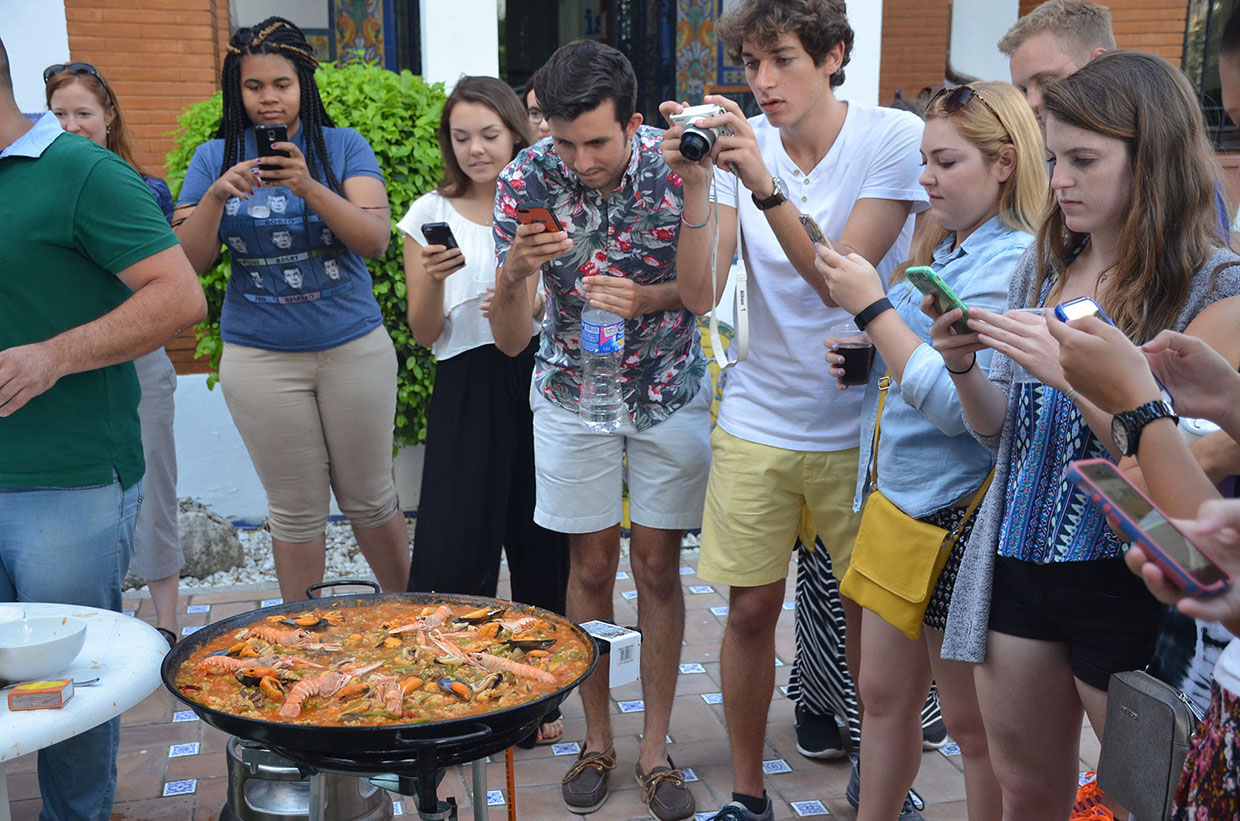
UF in Seville
Luis Álvarez-Castro
Twenty-four UF students enrolled in the program, four of whom each received a $1,000 scholarship from SPS, thanks to the generosity of our anonymous donor. In addition to enjoying Seville’s rich history, beautiful architecture, delicious food, and wonderful culture (flamenco and soccer included!), students toured several cities across Spain and even had the chance to visit Morocco. All these activities, combined with the courses they took on Spanish language, literature and culture, plus their stays with host families, made for a truly once-in-a-lifetime experience.
Reflections from UF students on their summers in Seville
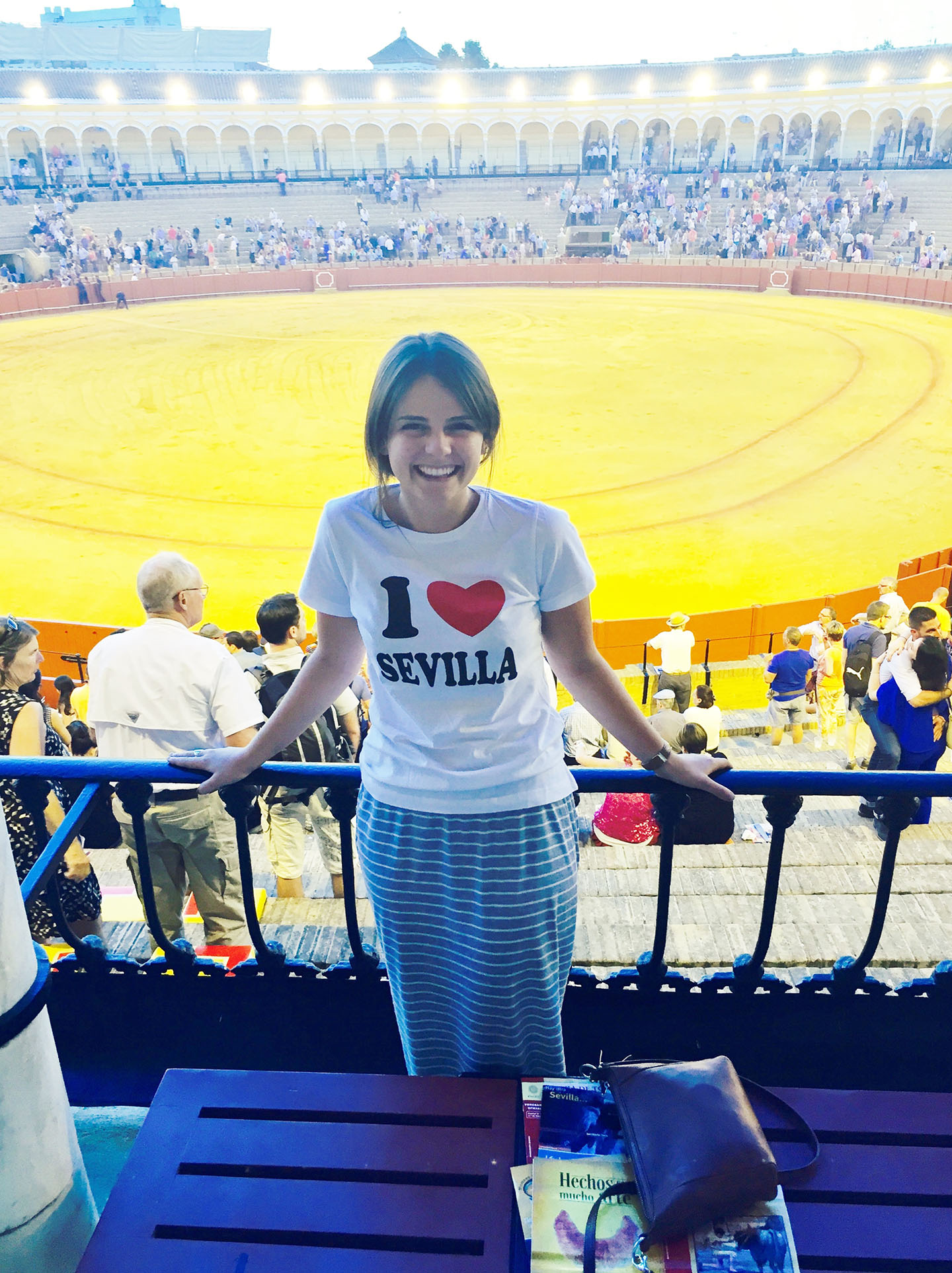
When I first thought about studying abroad in Spain, I never imagined I would actually follow through with it. Me? Speaking Spanish 24/7? I was terrified! I was worried when it came to a three-minute presentation in class. How was I going to sit at a dinner table with a host mom who only wanted to speak Spanish? But just like with everything good in this world, you have to first be willing to step outside of your comfort zone and try something exciting. Seville is a city full of history, culture, and life. Outside your front door is a whole world of fascinating and kind hearted people, smells of jacaranda trees and fresh coffee, and the sounds of families laughing at cafes and outdoor restaurants. On your walk to class you pass by beautiful architecture and incredible sights. When you return home, a home cooked meal awaits by an open window with a warm breeze, followed by a much-needed siesta. This program is not just about experiencing the richness of another culture and the beauty of another language, it is also a six-week adventure full of new friends, laughter, challenging coursework, and independence. If I could leave one piece of advice to current students considering a major or minor in the Spanish and Portuguese Department, I would tell them to study abroad and rediscover why you fell in love with the language.
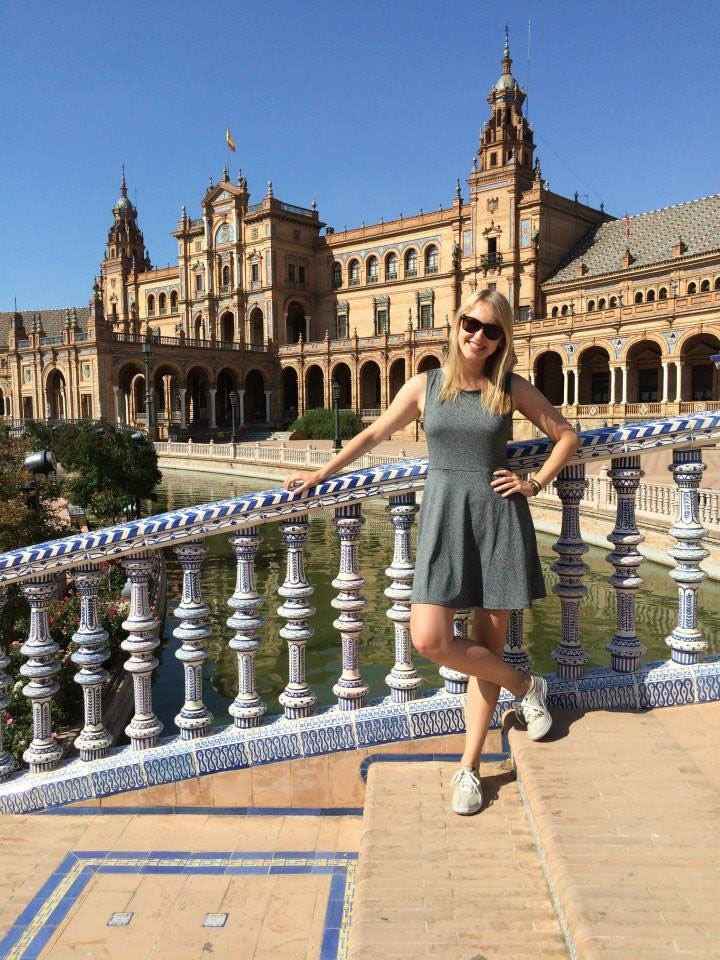
The UF in Seville program was truly an incredible experience. The program was impeccably organized and lead by caring, knowledgeable people who took the time to get to know each student personally, which created a very warm and open environment. Furthermore, the fact that so many aspects of this study abroad program were pre-arranged and organized by ISA was wonderful, because it provided me with opportunities and experiences of which I would otherwise never have dreamed, such as watching a Flamenco performance in a cave in Granada or becoming part of a Spanish family for six weeks. The other students with whom I shared this experience were also incredible; we all shared the same desire to experience new things and learn as much as we could, despite our fears or reservations. This lead to experiences such as eating caracoles (snails) in a local bar with my roommate while locals cheered us on, and running around a Spanish theme park, more excited than any of the children there. There is no question that this study abroad program is a once-in-a-life opportunity to experience a different world, to see life through someone else’s eyes. It was more difficult than I could have imagined saying goodbye to our program coordinators, my new friends, and of course, the beautiful city of Seville. I cannot wait to return again one day.
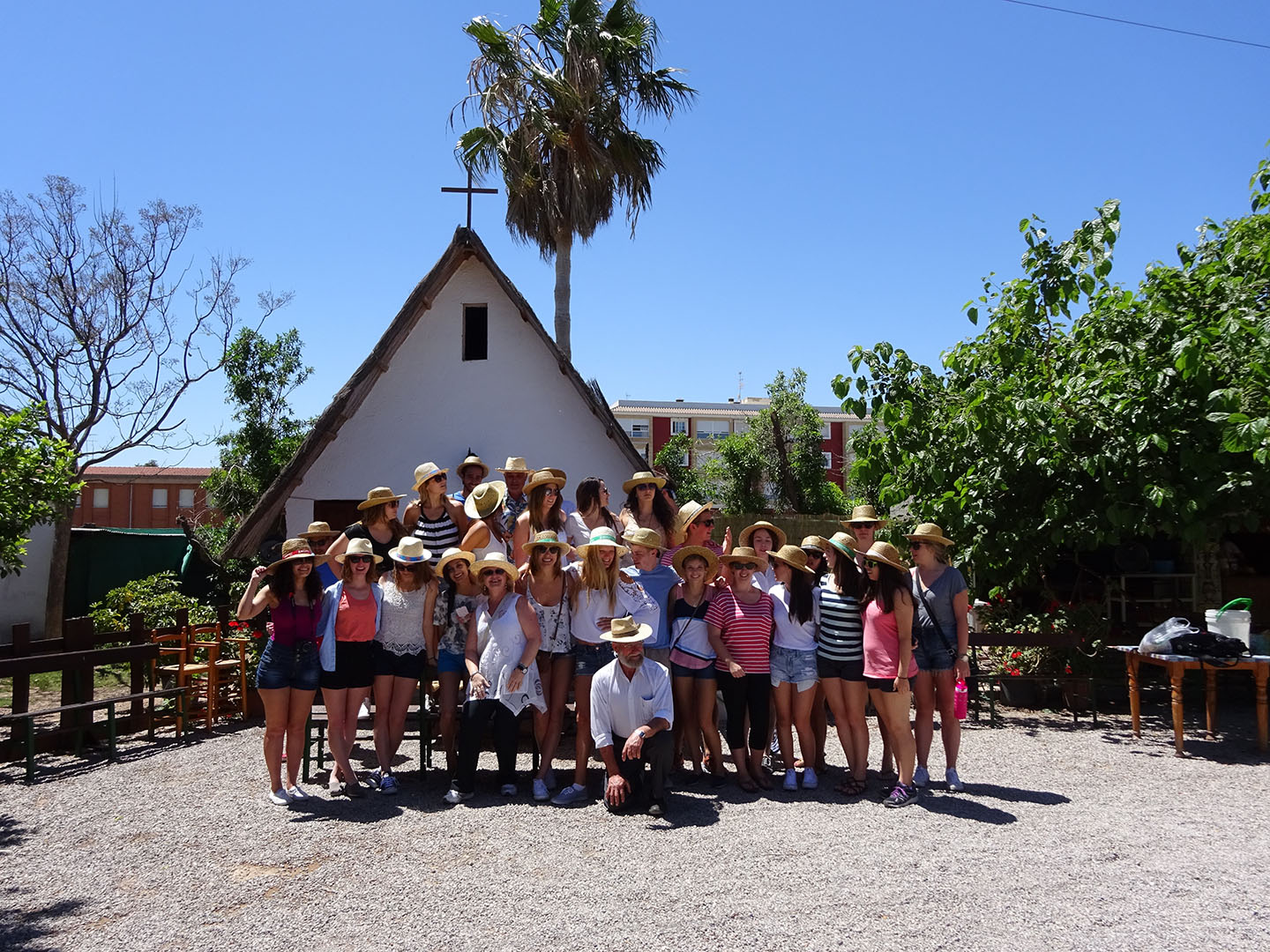
UF in Valencia
Susana Braylan
2015 marked the second year of our Language and Culture program in Valencia, having moved it from Santander in 2014. Valencia is located on the Mediterranean Sea, just a few hours from Barcelona and with a population around 1,720,000, it is rapidly becoming one of the most popular destinations on the Mediterranean coast. Propelling this renaissance is the Ciutat de les Arts i les Cièncias (City of Arts and Sciences), a museum complex and modern architectural masterpiece that adds to Valencia’s deep, multicultural roots, cosmopolitan flavor, and warm climate to make it a true Mediterranean gem.
During Summer A, 2015 UF graduate student Marcela Murillo and I took 25 students who enjoyed the many features that make Valencia so stunning and who made Valencia their home for 6 unforgettable weeks. This program offers language and culture classes at the 2000 and 3000 level, and allows students to ‘jump start’ their majors or minors. The experience of traveling, studying and living in a foreign country helps students to achieve improved communication skills and cultural awareness, as well as, in this case, an appreciation for the beautiful city and friendly people of Valencia.
You can learn more about their experiences in these bits of advice by watching one of the several videos created by students below.
Hola Estudiante:
Valencia es una ciudad buenísima para estudiar en el extranjero. Es para las personas a quienes les gusta explorar, aprender y disfrutar de la vida. Además, Valencia tiene un montón para hacer; como ir a la playa, comer comida muy rica, ir a los museos y hablar/salir con la gente joven. La playa es increíble porque continúa por muchos kilómetros sin edificios, es muy pura. Valencia tiene comida especial porque está cerca del mar y hay muchos mariscos frescos así como verduras y frutas también porque el clima es perfecto. En Valencia no hay nunca un momento aburrido porque siempre hay actividades que están ocurriendo. Aquí se habla y se sale muchos días de la semana. Es bueno que la gente sea alegre porque crea un buen lugar para socializar y practicar español. No creo que haya un lugar mejor que Valencia en España por todas estas razones.
Saludos.
– Devin
Estimado futuro estudiante:
¡Estoy emocionada que estás considerando el programa en el extranjero en Valencia! Sin este programa, yo no podría hablar en español con tanta confianza ni tendría una experiencia real de una cultura española. Antes de que te comprometas para ir a Valencia, deberías saber las razones para venir. El programa me ha dado las oportunidades para mejorar las habilidades para hablar, vivir con una familia española, comer muchas comidas nuevas y hacer muchos amigos nuevos de la Universidad de Florida. He aprendido en Valencia que se dice la frase “Qué guay” que significa “how cool” en inglés. Quiero decirte que este programa es “superguay”. Nunca olvidaré este programa cuyos beneficios son innumerables. Tú debes venir si te gusta conocer gente y aprender español.
¡Suerte!
– Catie